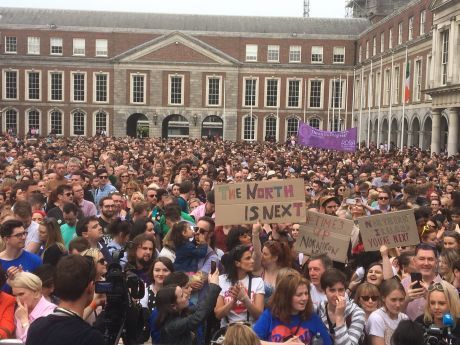Features
You are here
The Irish Vote is A Victory for All of Us!

May 31, 2018
My mother left Inishmore, one of the Aran Islands off the coast of Galway, when she was five years old. She was born in Boston but shortly after her parents returned to their birthplace. She grew up speaking Irish and it was the time of the war of independence. They moved back to Boston and were actively involved in the Irish community always supporting “the cause”.
She worked as a clerical staff at a Catholic high school. During the raging debates on abortion she walked into a student assembly with a non Catholic teacher who had a sign proclaiming that she was pro-choice on her pregnant belly. My mother had six children and four miscarriages and keenly understood the reality of women’s lives and was prepared to stand with those who supported the right to abortion.
Though she died a number of years ago she would have been thrilled to see that Inishmore voted in its majority to strike down the 8th along with the rest of the country. It would be hard to find a more remote area in Ireland with a population of 840, a small island in the north Atlantic, but its people voiced their strong desire for change and support for women’s rights. The 8th was the amendment introduced in 1983 that put the life of a fetus on par with that of the person carrying the pregnancy. It was in the Irish constitution and outlawed abortion. Women have been traveling to the UK for decades, using the abortion pill at home illegally, alone and afraid, or having children they did not chose to bear.
It was a massive, grass roots campaign that mobilized people across the country. The strength of the vote showed the overwhelming support that had been organized. The Irish Congress of Trade Unions (ICTU) had a long time position against the 8th since it was first introduced, and was a strong supporter of the “yes” vote. It called it a fundamental obstacle to women’s equality and inappropriate in a democracy. Its affiliated unions urged their members to take a strong stand for the right to control your own body.
Labour has also played a key role in other countries such as Canada in overturning restrictive abortions laws. It’s very important that the organized working class mobilize on questions outside the workplace and throw its weight behind reforms which make real differences in people’s lives.
Even the rural areas came out in support, often said to be much more conservative with the Catholic Church still holding sway, they were also with the majority. At a National Ploughing Championship farmers, primarily male, supported the repeal by 64% which shows the depth of the sentiment against the amendment. Rural women of course are much more isolated and not as easily connected to the networks which helped people to make the trip across the Irish Sea to secure an abortion.
Local pro-choice groups were set up in communities throughout Ireland with the heavy involvement of young people. The vote in support of gay marriage a few years ago pointed the direction the campaign was going but the final outcome was so overwhelming it amazed many activists. There was certainly a generational split in voting patterns which bodes well for the future.
Savita Halappanavar, a thirty-one year old dentist originally from India, suffered a miscarriage a number of years ago and was not allowed to have an abortion because the fetal heart was still beating. She died and it created a huge response within the country. Her parents said that the victory was a battle for Savita that had finally been won and thanked the campaigners for all the work that they had done.
Young Irish returned to the country from as far away as Australia, the United States and Canada to cast a vote, with crowds applauding them as they arrived home. In Toronto, they held demonstrations at Nathan Phillips Square showing their support for change. A number of them came to the “hand maids” picket that the Ontario Coalition for Abortion Clinics called at the leadership debate in the Ontario election outlining Doug Ford’s policies on creating barriers to abortion access in Ontario.
Northern Ireland still has a very restrictive abortion policy not in line with the law in the United Kingdom. Abortion is only allowed if the life or health of a woman is at risk. A large demonstration took place in Belfast after the success of the referendum in the south with signs, “We’re One All Irish Movement”, “Human Rights Shouldn’t Stop at the Border” and “We’re Unstoppable”, which shows the confidence a victory can bring. There is presently no government in the North since Sinn Fein withdrew from Stormont a while ago. It supported the campaign in the south while the Democratic Unionist Party is anti-choice.
It seems clear that the campaign will continue in Ulster and further mobilizations are under way. The success in the south is a huge step forward which shows that major gains can be won in these volatile times through strong movements from below. The working class has a significant role to play in fighting both exploitation and oppression in all its manifestations. This Irish victory is a concrete example for all of us that collective power can win against the forces of reaction.
Section:










